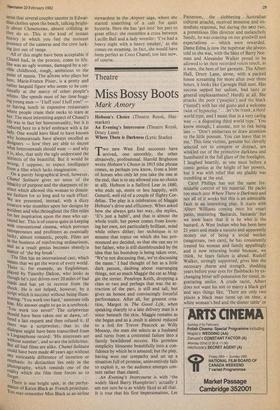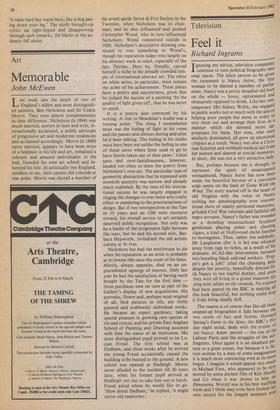Theatre
Miss Bossy Boots
Mark Amory
Hobson's Choice (Theatre Royal, Hay- market) An Evening's Intercourse (Theatre Royal, Drury Lane)
Where There is Darkness (Lyric Studio) Two new West End successes have arrived, one smoothly, the other abrasively, professional. Harold Brighouse wrote Hobson's Choice in 1915 (the phraSe comes, as perhaps you know, from a hirer of horses who only let you take the one at the end, that is to say allowed you no choice at all). Hobson is a Salford Lear in 1880, who ends up, more or less happily, with Goneril, well rid of a couple of flighty Cor- delias. The play is a celebration of Maggie Hobson's drive and efficiency. When asked how she always gets her way, she replies, `It's just a habit', and that is almost the whole truth. her power comes from know- ing her own, not particularly brilliant, mind while others dither; her technique is to assume that topics on which she has pro- nounced are decided, so that she can say to her father, who is still dumbfounded by the idea that his bootshop is being taken over, `We're not discussing that, we're discussing the name.' I had thought of her as a little dark person, dashing about rearranging things, not so much Maggie the cat as Mag- gie the terrier. Penelope Keith, dropping a class or two and perhaps that was the at- traction of the part, is still and tall, but gives an honest and convincingly forceful performance. After all, her greatest crea- tion, Margot in The Good Life, when speaking sharply to a late delivery man is a sister beneath the skin. Maggie remains as she began and as a :esult is almost reduced to a foil for Trevor Peacock as Willy Mossop, the man she selects as a husband and turns from a contented failure into a faintly bewildered success. His gormless simplicity blossoms beautifully into a con- fidence by which he is amazed; but the play, having won our sympathy and set up a situation full of promise, uninventively fails to exploit it, so the audience emerges con- tent rather than elated.
An Evening's Intercourse is with 'the widely liked Barry Humphries'; actually I am not sure he is as widely liked as all that. It is true that his first impersonation, Les
Patterson, the slobbering Australian cultural attache, received immense and im- mediate response, but during the next two, a pretentious film director and melancholy Sandy, he was coasting on our goodwill and expectations — which were rewarded. Dame Edna is now the superstar she always told us she was, with the likes of Barry Nor- man and Alexander Walker proud to be allowed to let their recorded voices touch, as it were, the hem of her garment. The Albert Hall, Drury Lane, alone, with a packed house screaming for more after over three hours, it looks like Carnegie Hall next. Has success sapped her sadism, bad taste or general unpleasantness? Hardly at all. She attacks the poor ('paupies') and the black. (`tinted') with her old gusto and a welcome twist of hypocrisy . .let's be frank, a third world type, and I mean that in a very caring way — a disgusting third world type.' You know enough, I assume, not to risk being late — 'Don't embarrass or draw attention to the little possum. You can leave that to me.' This time victims, genuine but cleverly selected not to compete or distract, are winkled out of the protective darkness and humiliated in the full glare of the footlights. I laughed heartily, as one must before a comic genius at the height of her powers, but it was with relief that my gladdy was trembling at the end.
Caryl Phillips has not the same for- midable control of his material. He packs too much into Where There is Darkness and not all of it works but this is an admirable fault in an interesting play. It starts with Albert Williams coming onto his smart patio, muttering `Ba4ards, bastards' but we soon learn that it is he who is the bastard. A West Indian who has been here 21 years and made a success and apparently money out of being a social worker (magistrate, two cars), he has consistently treated his woman and family appallingly and is now returning home because, we think, he fears failure is ahead. Rudolf Walker, strongly supported, gives him the necessary charm and strength, shedding years before your eyes for flashbacks by ex- changing bitter self-possession for timid, in- gratiating smiles. A crude racist, Albert does not want his son to marry a black girl and says things like, 'There are only two places a black man turns up on time, a white woman's bed and the dinner table' or
`it rains hard but warm here, like a dog pee- ing down your leg.' The nicely brought-up critics sat tight-lipped and disapproving through such remarks, the blacks in the au- dience fell about.







































 Previous page
Previous page